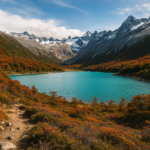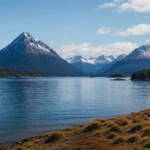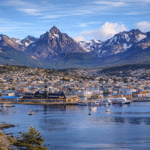 Overlooking Destination Research
Overlooking Destination Research
Why Weather and Peak Seasons Matter
One of the most common travel planning mistakes is not considering the weather or peak seasons of your chosen destination. Imagine arriving in a tropical paradise during monsoon season or a ski resort during the off-season—your plans could quickly unravel. Researching the weather helps you pack appropriately, while understanding peak seasons ensures you avoid inflated prices and overcrowded attractions. For budget travelers, traveling during the shoulder season (just before or after peak) can mean savings on flights and accommodations without compromising on the experience.
Local Events: The Hidden Game-Changers
Local events, whether festivals, holidays, or cultural celebrations, can significantly impact your trip. Missing out on a major event might mean fewer crowds, but it could also mean closed attractions or limited transportation. On the flip side, attending a local festival can offer an unforgettable experience. For digital nomads and cultural tourists, aligning your travel dates with events like food festivals or art exhibitions can add richness to your journey. Always check the local calendar to avoid surprises.
Cultural Norms and Etiquette
Ignoring cultural norms can lead to uncomfortable situations or even offend locals. Simple gestures like tipping, dress codes, or greetings vary widely across cultures. For example, in Japan, tipping is considered rude, while in the U.S., it’s expected. Solo travelers and young couples, in particular, should take time to learn basic etiquette to ensure a smooth and respectful experience. A little research goes a long way in fostering positive interactions and deepening your connection with the destination.
Safety Concerns: Don’t Skip This Step
Safety should always be a priority, especially for solo travelers and families. Researching local safety concerns, such as areas to avoid, common scams, or health advisories, is essential. For adventurers and ecotourists heading to remote areas, understanding the terrain and weather conditions can prevent dangerous situations. Websites like the U.S. State Department or the U.K. Foreign Office provide reliable travel advisories. Don’t forget to check for any vaccination requirements or health precautions, especially in less developed regions.
Practical Tips for Effective Research
- Use reliable sources like official tourism websites, travel blogs, and forums.
- Check weather trends for the specific months of your trip.
- Read reviews from recent travelers for up-to-date insights.
- Join online communities or groups related to your destination for firsthand advice.
Taking the time to research your destination thoroughly ensures you’re prepared for whatever comes your way. Whether you’re a backpacker on a shoestring budget or a family planning a relaxing getaway, knowledge is your best travel companion.
Underestimating Budget Planning
Budget planning is the cornerstone of any successful trip, yet it’s one of the most common mistakes travelers make. Whether you’re a budget traveler, a digital nomad, or a family seeking a stress-free vacation, failing to plan your finances properly can lead to unexpected stress and disruptions. Let’s dive into the pitfalls to avoid and how to plan smarter.
Failing to Account for Hidden Costs
One of the biggest budgeting mistakes is overlooking hidden expenses. Visas, transportation, and local taxes can quickly add up, especially in countries with complex entry requirements or expensive public transport systems. For example, some destinations charge hefty visa fees or require travelers to pay departure taxes at the airport. Here’s a quick checklist of often-forgotten expenses:
- Visa and entry permit fees
- Airport transfers or local transportation
- Travel insurance
- Tips and service charges
- Local SIM cards or roaming costs
To avoid surprises, research your destination thoroughly and allocate a buffer for these costs. A little preparation goes a long way!
Not Tracking Expenses or Setting Contingency Funds
Another common mistake is not tracking your spending during the trip. It’s easy to lose track of small purchases, like snacks or souvenirs, but they can make a dent in your budget. Use a budgeting app or a simple spreadsheet to monitor your expenses daily.
Equally important is setting aside a contingency fund. Unexpected events, such as flight cancellations, medical emergencies, or even spontaneous activities, can arise. A good rule of thumb is to reserve 10-15% of your total budget for emergencies. This safety net ensures you’re prepared for the unexpected without derailing your trip.
“A well-planned budget is like a roadmap for your trip—it keeps you on track and reduces stress.”
Budget planning doesn’t have to be complicated. By accounting for hidden costs, tracking your expenses, and setting aside a contingency fund, you’ll travel with confidence and peace of mind. After all, the goal is to enjoy your journey, not worry about finances!
Poor Timing and Booking Strategies
Timing is everything when it comes to travel planning. Booking too late or too early can lead to missed opportunities, higher costs, or unnecessary stress. Let’s dive into how you can nail your timing and booking strategies for 2025 to save money and maximize your travel experience.
Why Booking Too Late Can Cost You
Waiting until the last minute to book flights and accommodations often means paying premium prices. Airlines and hotels tend to increase their rates as availability decreases, especially during peak travel seasons. Key tips to avoid this:
- Book flights at least 2–3 months in advance for domestic trips and 3–6 months for international travel.
- Set up price alerts on platforms like Google Flights or Skyscanner to monitor fare changes.
- Be flexible with your dates to take advantage of cheaper rates on weekdays or off-peak hours.
The Pitfalls of Booking Too Early
While booking early can save you money, doing so too early can sometimes backfire. Airlines and hotels often release their best deals 3–9 months before the travel date, and booking before this window might mean missing out on discounts. Here’s what to keep in mind:
- Research historical price trends for your destination to identify the ideal booking window.
- Use tools like Hopper to predict when prices are likely to drop.
- Check cancellation policies in case you find a better deal later.
Missed Deals and Discounts for 2025 Travel
Deals and discounts are a budget traveler’s best friend, but they’re easy to miss if you’re not proactive. Here’s how to stay ahead of the game:
- Sign up for newsletters from airlines, travel agencies, and hotel chains to be the first to know about promotions.
- Follow travel deal websites like Secret Flying or Scott’s Cheap Flights for exclusive offers.
- Leverage credit card rewards and loyalty programs to save on flights and accommodations.
Tailored Tips for Different Travel Styles
Different travelers have different needs, so here’s how to apply these strategies based on your travel style:
| Traveler Type | Key Booking Strategy |
|---|---|
| Budget Travelers | Focus on deals and flexibility; consider budget airlines and hostels. |
| Digital Nomads | Book long-term stays in advance to secure discounts on monthly rates. |
| Families | Plan early to ensure availability of family-friendly accommodations and flights. |
| Adventurers | Look for last-minute deals on flights to remote destinations. |
By mastering the art of timing and booking, you’ll not only save money but also enjoy a smoother, stress-free travel experience. Start planning early, stay flexible, and keep an eye out for those unmissable deals!
Overpacking or Underpacking
Bringing Unnecessary Items or Forgetting Essentials
Whether you’re a budget traveler, a digital nomad, or a family on vacation, striking the right balance when packing is crucial. Overpacking can mean hauling around heavy bags and paying excess baggage fees, while underpacking might leave you scrambling for essentials. Here are some tips to help you pack smarter:
- Make a checklist: Before you start packing, create a detailed checklist of everything you’ll need. This prevents you from forgetting essentials like chargers, adapters, or medications.
- Pack versatile clothing: Choose items that can be mixed and matched. A neutral color palette works wonders for creating multiple outfits with fewer pieces.
- Think lightweight: Opt for lightweight, quick-drying fabrics that are easy to wash and dry, especially if you’re traveling light or moving frequently.
- Avoid “just in case” items: Unless it’s something you’re certain you’ll use, leave it behind. Most items can be purchased at your destination if needed.
Not Preparing for Specific Activities or Climates
Whether you’re heading to a tropical beach or a snowy mountain, researching your destination’s climate and activities is key to packing appropriately. Here’s how to prepare:
- Check the weather: Look up the forecast for your travel dates and pack accordingly. Don’t forget layers if you’re visiting a place with fluctuating temperatures.
- Plan for activities: If you’re hiking, swimming, or attending formal events, make sure you have the right gear and attire. For example, sturdy shoes for hiking or a swimsuit for the beach.
- Consider cultural norms: Some destinations have specific dress codes. Research local customs to ensure you’re dressed appropriately, especially when visiting religious sites.
- Pack smart for work: Digital nomads should prioritize lightweight tech gear, adapters, and portable workstations with a reliable internet connection.
Packing Tips for Different Travel Styles
Your travel style and destination will influence your packing strategy. Here’s a quick guide for each type of traveler:
| Traveler Type | Packing Focus |
|---|---|
| Budget Travelers | Focus on lightweight, multipurpose items to save on baggage fees and space. |
| Digital Nomads | Prioritize tech essentials like laptops, chargers, and portable Wi-Fi devices. |
| Adventurers | Pack durable gear for outdoor activities, including first aid kits and weatherproof clothing. |
| Families | Bring snacks, entertainment for kids, and extra clothing for unexpected messes. |
| Solo Travelers | Keep it minimal but include safety items like a portable charger and a money belt. |
Neglecting Travel Insurance and Documentation
The Hidden Risks of Skipping Travel Insurance
Travel insurance might seem like an unnecessary expense, but it’s a small price to pay for peace of mind. Whether you’re a budget traveler or a digital nomad, unexpected emergencies like medical issues, trip cancellations, or lost luggage can derail your plans. For families and solo travelers alike, insurance ensures you’re covered when things go wrong. Think of it as a safety net that lets you focus on enjoying your trip rather than worrying about the “what ifs.”
Passport and Visa Basics You Can’t Ignore
Before you even book your flight, check your passport’s expiration date. Many countries require your passport to be valid for at least six months beyond your travel dates. For first-time travelers and cultural tourists, it’s also crucial to research visa requirements. Some destinations offer visa-free entry, while others require advance applications. Save yourself the stress of last-minute surprises by doing your homework early.
Why Documentation Matters
Your travel documents are your lifeline on the road. Here’s a quick checklist to ensure you’re prepared:
- Passport: Check expiration and validity requirements.
- Visas: Research entry requirements for your destination.
- Travel Insurance: Invest in a plan that covers emergencies and cancellations.
- Copies of Important Documents: Keep digital and physical backups of your passport, visa, and insurance details.
For adventurers heading off the beaten path, having proper documentation can make all the difference in case of unexpected situations.
Overplanning or Underplanning Itineraries
The Pitfall of Cramming Too Many Activities
One of the most common travel planning mistakes is trying to fit too many activities into a short trip. While it’s tempting to see and do everything, overloading your itinerary can leave you exhausted and stressed, rather than relaxed and inspired. For budget travelers, this can also lead to overspending on tickets, tours, and transportation. Instead, prioritize quality over quantity. Focus on a few key experiences that truly resonate with your interests, and leave room for spontaneity. After all, some of the best travel moments happen when you’re not rushing from one place to another.
Failing to Research Key Attractions
On the flip side, underplanning can be just as detrimental. Arriving at a destination without researching key attractions or logistics can lead to missed opportunities and unnecessary expenses. For example, some popular sites require advance bookings, and failing to secure tickets could mean being turned away. Digital nomads and freelancers, in particular, should research coworking spaces and internet reliability to avoid productivity hiccups. Similarly, families traveling with children should check for age restrictions or suitability at attractions to ensure a smooth experience.
Exploring Alternative Experiences
While iconic landmarks are often top of the list, don’t overlook alternative experiences that offer a deeper connection to your destination. For solo travelers, this might mean joining a local workshop or walking tour to meet like-minded people. Adventurers and ecotourists can seek out hidden trails or lesser-known natural wonders to avoid crowds. Urban explorers might delve into local markets or neighborhood eateries for an authentic taste of the city. By balancing must-see spots with off-the-beaten-path gems, you’ll create a richer, more memorable travel experience.
Practical Tips for Balanced Planning
Here are some actionable tips to help you strike the right balance:
- Create a loose itinerary: Outline your main goals but allow flexibility for unexpected discoveries or rest days.
- Use a mix of research tools: Combine guidebooks, blogs, and local recommendations to get a well-rounded perspective.
- Book essentials in advance: Reserve accommodations, transportation, and tickets for high-demand attractions to avoid last-minute stress.
- Leave buffer time: Factor in travel delays and downtime to ensure a relaxed pace.
Remember, the goal of travel is to enjoy the journey, not just to tick off a checklist. By avoiding the extremes of overplanning or underplanning, you’ll set yourself up for a fulfilling and stress-free adventure.
Ignoring Health and Safety Precautions
Traveling is all about adventure and discovery, but it’s also about staying safe and healthy. Ignoring health and safety precautions can turn your dream trip into a nightmare. Whether you’re traveling alone, with family, or as a digital nomad, taking a few simple steps can make all the difference.
Not Researching Local Health Advisories or Vaccinations
Before you pack your bags, take a moment to research local health advisories and vaccination requirements for your destination. Some countries require specific vaccinations, like yellow fever or typhoid, while others may have ongoing health concerns you should be aware of. Websites like the CDC Travel Health or your country’s health department can provide up-to-date information.
- Check if your destination has any ongoing health risks, such as malaria or Zika virus.
- Ensure your routine vaccinations are up to date.
- Pack a basic health kit with essentials like pain relievers, band-aids, and any prescription medications.
Remember, prevention is always better than cure, especially when you’re far from home.
Failing to Prepare for Emergencies or Unexpected Situations
Situations
No one wants to think about emergencies while planning a trip, but being prepared can save you a lot of stress. Start by knowing the local emergency numbers and the location of the nearest hospital or clinic. If you’re traveling to remote areas, consider carrying a portable first aid kit and a reliable communication device.
- Make copies of important documents like your passport, visa, and travel insurance.
- Invest in comprehensive travel insurance that covers medical emergencies.
- Share your itinerary with a trusted friend or family member.
It’s also a good idea to familiarize yourself with local customs and laws to avoid unintentional mishaps. For example, some countries have strict rules about medication or alcohol. A little research goes a long way in ensuring a smooth trip.
FAQ: Health and Safety While Traveling
- Do I really need travel insurance?
- Yes! Travel insurance can cover medical emergencies, trip cancellations, and lost luggage. It’s a small expense for peace of mind.
- What should I do if I get sick while traveling?
- Contact your travel insurance provider for guidance. Locate the nearest medical facility and keep your health kit handy for minor issues.
- How can I stay safe as a solo traveler?
- Stay in well-reviewed accommodations, avoid risky areas, and trust your instincts. Let someone know your whereabouts regularly.
Traveling is about creating memories, but your health and safety should always come first. With a bit of preparation, you can focus on enjoying your journey, knowing you’re ready for whatever comes your way.
About Grace Castle
Grace Castle, 29, is a passionate traveler and digital nomad who turned her love for exploring the world into a career. With years of experience traveling across different countries, she has mastered the art of smart travel planning, working remotely while discovering new destinations.
An expert in budget travel, local culture, and remote work, Grace shares valuable tips for those looking to travel more while spending less. Her mission is to help fellow travelers explore the world with ease, safety, and authentic experiences.
When she’s not writing about her adventures, Grace can be found discovering cozy cafés, learning new languages, or planning her next trip.


 Overlooking Destination Research
Overlooking Destination Research
 Situations
Situations







